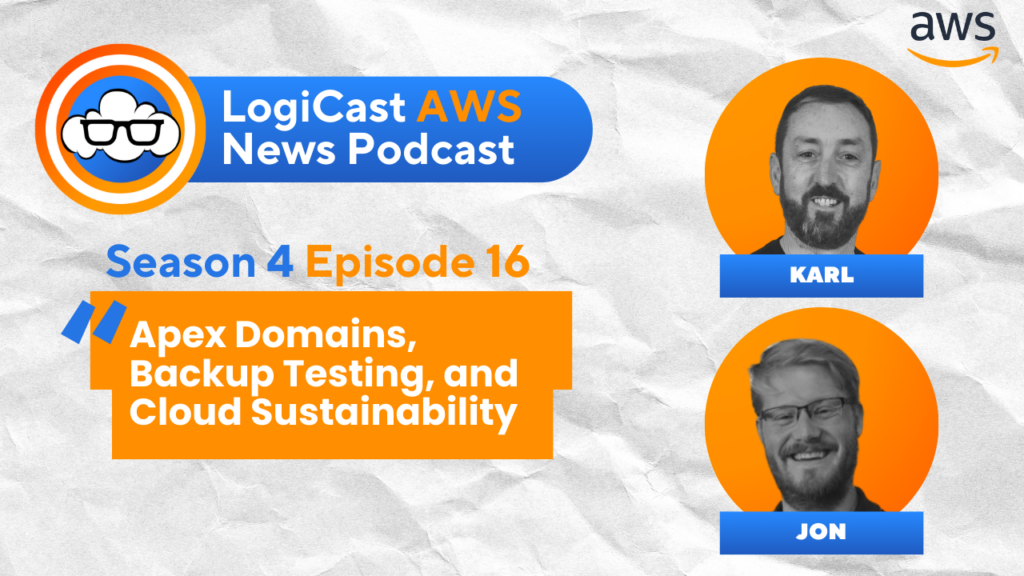Karl Robinson
March 8, 2023
Karl is CEO and Co-Founder of Logicata – he’s an AWS Community Builder in the Cloud Operations category, and AWS Certified to Solutions Architect Professional level. Knowledgeable, informal, and approachable, Karl has founded, grown, and sold internet and cloud-hosting companies.
Introduction – can salespeople really get AWS Certified?
In this article, I describe my journey to becoming 4 x AWS Certified to Solutions Architect Professional level in the hope that it might inspire and help any budding AWS fans to achieve AWS certifications of their own. I’m not unique – I am part of a global community of AWS Certified people who will all have taken a different journey to achieve AWS Certification, and some have achieved significantly more than me. I am a business founder and owner who has spent much of my career in IT sales and marketing although I am a closet geek and have picked up a lot of practical experience during my career. Read on if you want to find out more about why I started, where I started, how I learned, and how I ultimately went on to pass 4 proctored AWS Certification exams.[featured_image]
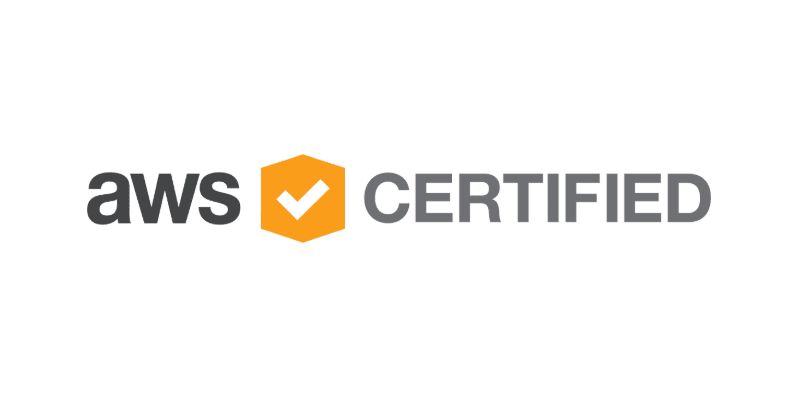
What is AWS Certification?
AWS Certifications are offered as a way to showcase knowledge of Amazon Web Services. There are many courses available both from AWS and from third parties to learn the content required to sit an AWS certification exam. Exams are proctored and can either be taken in a Pearson Vue test center, or in the comfort of your own home with a remote proctoring service – more on that later.
What AWS Certifications are available?
There are 12 AWS Certifications available in 4 main categories.

Foundational (requires 6 months of fundamental AWS and cloud industry knowledge)
– AWS Cloud Practitioner
Associate Level (requires one year of experience solving problems and implementing solutions with the AWS Cloud)
– AWS Solutions Architect Associate
– AWS Developer Associate
– AWS SysOps Administrator Associate
Professional Level (requires 2 years of experience in designing, implementing, and troubleshooting solutions on the AWS Cloud)
– AWS Solutions Architect Professional
– AWS DevOps Engineer Professional
Specialty (requires varying levels of technical competence in the specific domain of the exam)
– AWS Security Specialty
– AWS Advanced Networking Specialty
– AWS Machine Learning Specialty
– AWS Data Analytics Specialty
– AWS Database Specialty
– SAP on AWS Specialty
Why did I want to become AWS Certified?
You will have your own reasons for wanting to become AWS Certified which may overlap with mine or may be completely different. I chose to become AWS Certified for 3 main reasons:
1. I wanted to learn about AWS services so I can sound knowledgeable to customers and prospects – I am not an engineer so I could not learn ‘on the job’ as it is not a requirement of my primary role to use AWS on a regular basis.
2. I wanted proof of my knowledge to show to my customers and peers – the Certification badges are a great way to do that, and I make sure I share them wherever possible.
3. I founded Logicata, an AWS Consulting Partner, and in order to achieve and maintain AWS Partner status, a certain number of AWS Certifications must be achieved and maintained, and I wanted to lead the business from the front before expecting my team to begin their own AWS Certification journey.
Where did I start?
AWS Online Training
AWS has several introductory online courses for AWS Partners with self-paced e-learning and online knowledge check tests. On successful completion of the tests, a certificate is issued.
Business Professional – first I attempted AWS Business Professional – this is, as you would expect, commercially focused training that introduces the basic value proposition of the Cloud, the AWS Partner Program, etc. The training takes about 4 hours and the test is fairly easy – it is not proctored and you can continue to retake it until you pass.
Technical Professional – next I went on to AWS Technical Professional. This course gives a high-level introduction to some of the more commonly used AWS services such as EC2, RDS, S3, etc. Again this is around a 4-hour time commitment and has an online test similar to Business Professional.
The above certifications do count towards your employer’s status as an AWS Partner so are well worth doing, and are a great introduction to learning AWS services.
Where to next?
Now I had 2 certificates, and I’d got the certification bug – it was time for me to tackle my first ‘proper’ AWS Certification – the AWS Cloud Practitioner.
AWS Cloud Practitioner
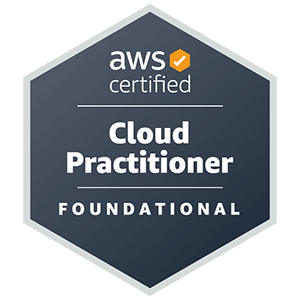
AWS Cloud Practitioner is the only ‘Foundational’ level AWS Certification, and it builds upon the knowledge you have gained in the Business and Technical Professional certifications. AWS offers free self-paced e-learning courses for Cloud Practitioner, both in traditional slideware format and in a gamified format in the AWS Cloud Quest training. I took the training before Cloud Quest existed, and probably due to my advancing years I would still have gone with the slideware option, but I do have younger colleagues who think that Cloud Quest is a great option for them! AWS Cloud Practitioner has a proctored exam, meaning you need to be observed under full exam conditions to pass this certification. The test is not too difficult and is scored out of 1000 with a pass mark of 700. I achieved a score of 995 which I was super happy about, and it remains to this day my highest score in an AWS Certification exam – it was all downhill from here! (read on for more scores…) Pass/Fail was advised immediately on the day and detailed scoring was provided later.
Buoyed by my success with AWS Cloud Practitioner, I decided to step things up a level and go for my first ‘proper’ technical AWS Certification – AWS Solutions Architect Associate.
Solutions Architect Associate
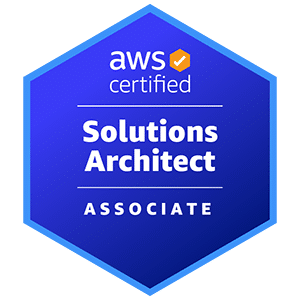
Now we’re getting technical, and really you need to get hands-on with AWS in order to grasp the concepts required to pass AWS Solutions Architect Associate. Don’t worry, you can learn most if not all that you need within the AWS Free Tier, so you needn’t run up a scary AWS bill (if you remember to clean up after yourself!). One tip I recall from the training is that you need to know how to build an AWS VPC from scratch – subnets, security groups, etc, in order to pass the exam. I took that tip literally and labbed this several times until I could do it without external prompts, and this served me well.
I used the AWS Certified Solutions Architect Associate training from aCloud Guru which primarily featured Ryan Kroonenberg. The course is hands-on with loads of labs so it will get you up and running on AWS.
The course also has a lot of knowledge checks and a big test at the end to prepare you for the exam.
The pass mark for the exam was 720, again with pass/fail advised on the day and detailed scoring shared later. I was happy to achieve a score of 940!
SysOps Administrator
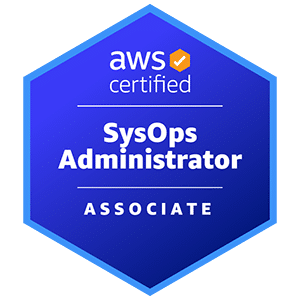
AWS Certified SysOps Administrator builds on Solutions Architect Associate and focuses on deploying, managing, and operating workloads in AWS. This exam was the only AWS certification to include Labs in the exam rather than just the usual multiple choice/multiple answer exams, but at the time of writing those labs were being removed. I did the exam before the labs were added, so I have no experience sitting an AWS exam with lab work.
I used the AWS SysOps Administrator course from aCloud Guru which primarily featured Faye Ellis.
I also decided to take some 3rd party practice tests to prepare for this exam – I used the tests from Whizlabs.
The pass mark for the exam was 720, again with pass/fail advised on the day and detailed scoring shared later. I was happy to achieve a score of 837 – scores starting to slip a little now…
Solutions Architect Professional
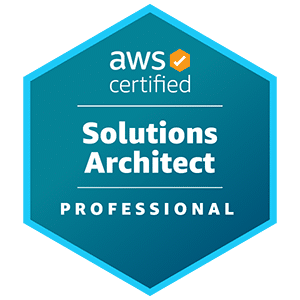
Getting serious now, I set my sights on a Pro level cert. I thought perhaps I could do this without any training, so I attempted some practice exams on Tutorials Dojo. They are tough, and I failed, so back to the training I went.
As an AWS Community Builder I was entitled to free access to Cloud Academy, so I followed the AWS Solutions Architect Professional track there, mostly by Stuart Scott. Warning – there are a lot of hours of training to consume – it is quite a time commitment.
I also supplemented my training with the ‘Ultimate AWS Certified Solutions Architect Professional‘ course on Udemy by Stephane Maarek.
Feeling confident in my ability to take the exam, I booked it using my exam voucher from the AWS Community Builder program. As the date approached, I realized I did not feel ready so I deferred the exam for 3 months. As the date approached again, I still did not feel ready, so I deferred it one last time – you can defer twice without losing your exam credit. I knew the SAP-C01 exam was being retired and replaced with SAP-C02, so I thought I had better take the exam before I needed to do yet more training!
Something I found super useful was the AWS Solutions Architect Professional exam challenge webinars run by Rob Callaghan and Michelle Restivo. In these sessions, the trainer breaks down the anatomy of a question and gives you a structured approach to working out the answer. What I learned in these sessions was invaluable, and helped me to answer questions that I did not really know the answer to!
The pass mark for the exam was 750, with no pass/fail advised on the day – an agonizing wait to find out. Just scraped in on this one with a score of 765 – but a pass is a pass, right?!
Where to sit the exam – online or test center?
So I mentioned earlier in the post that you now have 2 options for taking proctored AWS certification exams – Pearson Vue testing centers and remote proctoring at home or another remote location. I’ve done both so I will share my thoughts and preferences.
Pearson Vue Test Centre
Pearson Vue has over 5000 test centers in 180 countries – so chances are they have one near you. My nearest test center is in Crawley which is about a half-hour’s drive from where I live. The advantage of going to a test center is that exam conditions are provided for you, so you can just turn up, take the test and leave. A distraction-free workstation is provided, along with an erasable whiteboard and marker pen should you wish to make notes – you’re not allowed to take any notes away from the test center. They also provide lockers for your valuables as you are not permitted to take any personal effects into the examination room, including mobile phones and even watches. The downside is that you need to travel to the test center.
Online proctored exam at home
Since the Covid 19 pandemic, you have had the option to take an online proctored exam at home. This is great if you don’t live within a reasonable distance of a testing center, and allowed people to continue to take exams during the lockdown. Before the exam, you are sent instructions on how to prepare your room. You must have a workstation with only a single monitor – if it’s a laptop, no external monitor is allowed. There can be no paper visible in the room, and no clocks or watches are allowed. You must show the proctor around the room with your webcam prior to starting the exam, and if there is anything that is forbidden they will ask you to remove it before sitting the exam. The advantage of this approach is that you can take an exam from literally anywhere with an Internet connection. The disadvantage if you have a ‘busy’ office like me, is that you may need to do a lot of preparation to get your room prepped for exam conditions. Having tried both methods I can honestly say it is quicker and easier for me to drive to a testing center. But it was great to be able to sit my SysOps Administrator exam during lockdown conditions. What’s best for you will of course depend on your own individual circumstances.
AWS Certification Expiry & Renewal
Like all good things, some AWS certifications do not last forever.
– Business and Technical Professional have no expiry date.
– AWS Cloud Practitioner has no expiry date.
– Associate Level Certifications expire after 3 years (Solutions Architect Associate auto-renews if/when you pass Solutions Architect Professional)
– Professional and Specialty level certificates expire after 3 years.
Benefits of AWS Certification
There are many benefits to becoming AWS Certified – I’ve tried to list as many as I can below.
- Employability – many employers such as Logicata are looking for verified AWS skills and certifications are a great way to stand out. AWS Partners also need those certifications to achieve and maintain their partner status, so your certifications are desirable. However, certifications alone won’t get you hired – you’ll also need demonstrable experience to land that dream job.
- Certificate – you get a nice certificate that you can frame and put on your wall, share on social media, or with prospective employers. It’s important to note that your certification belongs to you, not your employer, even if they supported you to get it. So if you change jobs, you are still certified!
- AWS Credits – If you work for an AWS Partner, your employer will receive AWS Credits once a quarter for any AWS certifications you have achieved – £$300 for every Associate level cert, and $500 for Professional and Specialty certs.
- Exam Discount Vouchers – Every time you pass an exam, you get a 50% voucher towards your next exam (they know how to keep you hooked!)
- Credly Badges – the Credly website is free and offers a great way to showcase your certifications. It also pulls through to LinkedIn so you can show your certifications on your LinkedIn profile, so colleagues, customers, prospects, and recruiters can see them (yes we do look for these when we are hiring!).
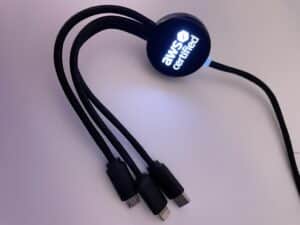
- Lounge Access & more swag at AWS events – you’ll find AWS Certified Lounges at AWS Summits and AWS re:Invent (and other events I may not have mentioned). These lounges are a great place to recharge – both yourself and your devices – you can grab a coffee, a seat, a power socket, and chat with other AWS Certified individuals (if you so wish, we’re a friendly bunch!). You’ll probably also bag some free ‘AWS Certified’ swag – I’ve collected stickers, pins, and even a 3-way USB charge lead with a light-up AWS Certified Logo! (if that’s not enough to tempt you, I don’t know what is…)
- AWS Certified Global Community LinkedIn Group – you’ll gain access to an exclusive LinkedIn group with over 125,000 members – this is a great place to share content, seek jobs, and network with like-minded individuals.
- AWS Certified Swag Store – you’ll get access to the exclusive AWS Certified swag store where you can purchase a range of AWS Certified merchandise such as polo shirts, t-shirts, and hoodies. Be warned though – for some reason the fulfillment company does not ship outside the USA. I had to send mine to a US-based colleague who kindly forwarded it on. By the time I paid the shipping fees and UK customs charges, this was very expensive swag! But I did work hard to get access to the store, so I justified it to myself! I also discovered services that will forward packages for you outside of the US if you too are desperate for some AWS Certified swag!

- That Gold Lame Jacket! – If you are smart enough and dedicated enough to achieve all 12 AWS certifications and hold them simultaneously (so you must take all exams in 3 years), you will be entitled to the exclusive gold lame jacket so you can really stand out and showcase your achievement! I’ve heard that there may be a few other conditions, such as needing to be in Seattle on a certain day to be presented with the jacket, but this is hearsay…
Signing off…
So, there you have it – my AWS Certification Journey. I hope I have shown you the benefits of becoming AWS Certified, shared some useful resources, and inspired you to start or continue your own AWS Certification journey. Please reach out to me if you have any questions, connect with me on LinkedIn, listen to my Logicast podcast, or just comment and share details of your own journey. Good luck, and see you in the AWS Certified Lounge!



